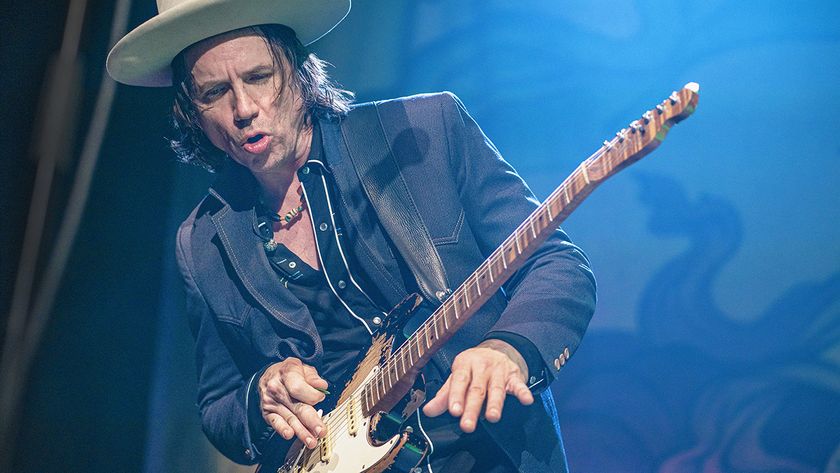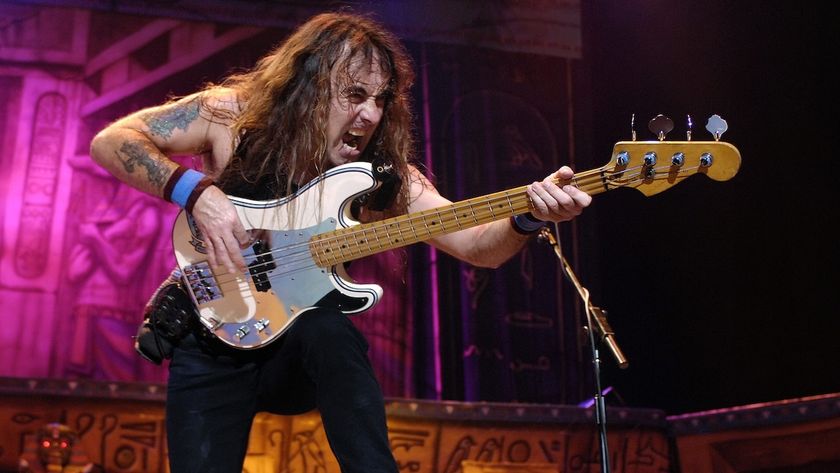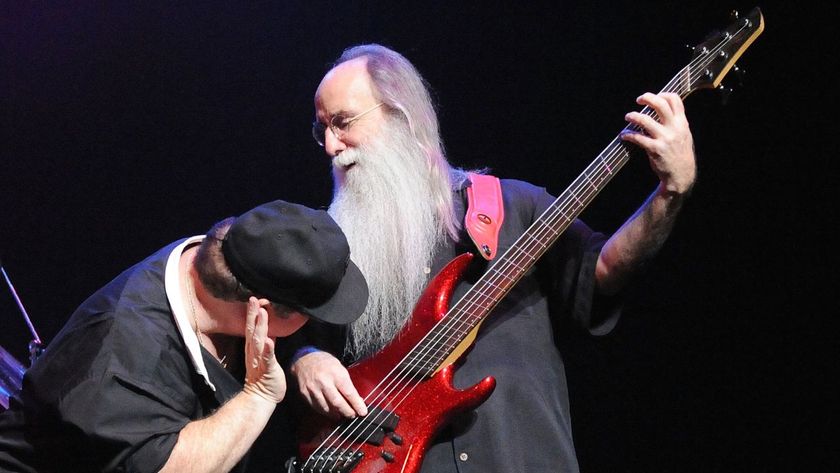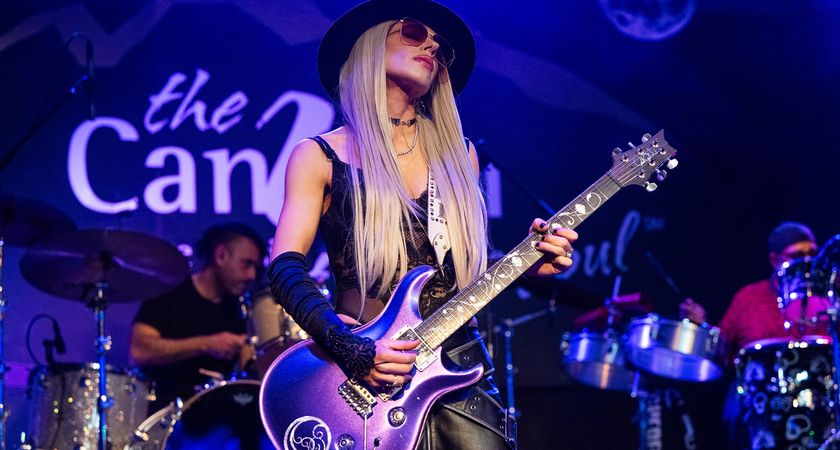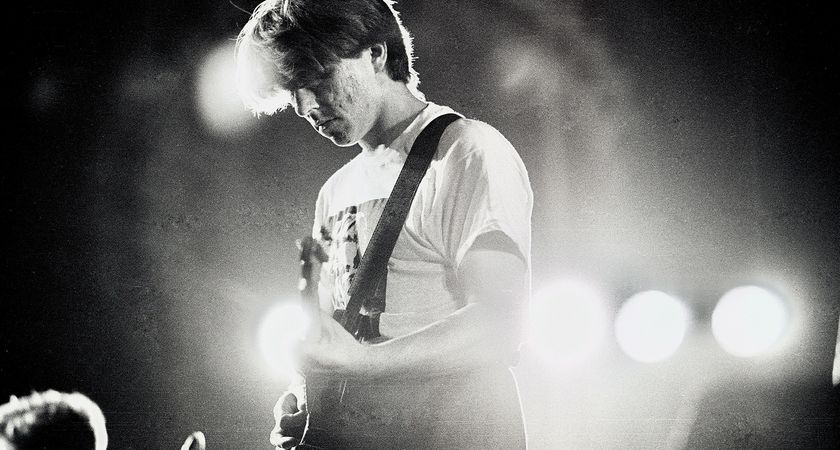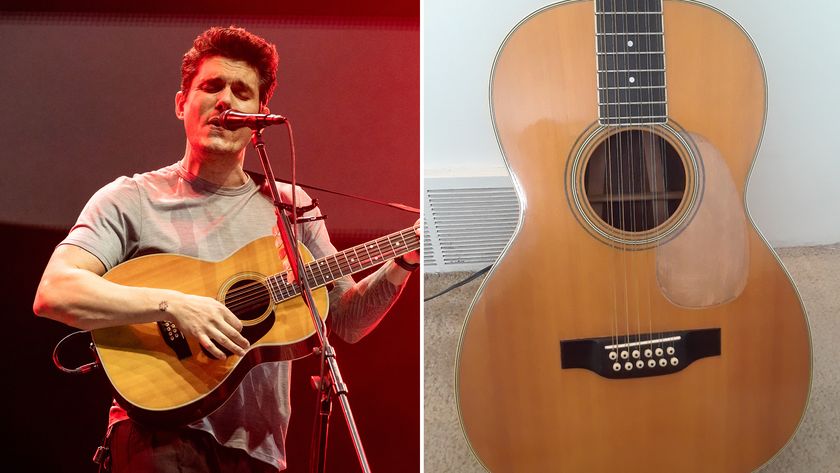Interview: Glenn Hughes Discusses Deep Purple, Gary Moore, Bill Nash Basses and Writing with Black Country Communion
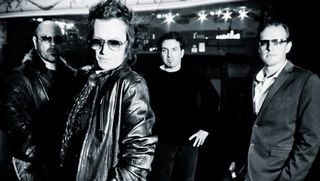
When it comes to rock and roll bloodlines, you'd be hard pressed to find an active artist with a more impressive pedigree than bassist/vocalist Glenn Hughes, who fronts British/American supergroup Black Country Communion.
Hughes, who was born in 1951 in Staffordshire, England, came to prominence in the early '70s as a member of British funk-rock pioneers Trapeze. That led to a career-making spot in the commercially successful Mark III and IV lineups of Deep Purple in the mid-'70s, when he replaced Roger Glover and evolved into one of the band's main songwriters, co-penning "Holy Man," "You Keep On Moving" and "Burn."
Before forming Black Country Communion with Joe Bonamassa, Derek Sherinian and Jason Bonham in 2010, Hughes released several solo albums; enjoyed a brief stint with Black Sabbath; collaborated with Gary Moore, Tony Iommi, Chad Smith and Pat Thrall; and appeared on recordings by Whitesnake, George Lynch, Richie Kotzen and Manfred Ehlert's Amen -- to name just a few.
Hughes was grounded during much of the 1980s due to his struggle with drugs and alcohol, as detailed in his autobiography, Glenn Hughes: The Autobiography, from Deep Purple to Black Country Communion,one of Guitar World's Top 15 Books of 2011.
Black Country Communion have released two critically acclaimed studio albums -- Black Country (2010) and 2 (2011) -- with a new one in the works for 2012. Their first live album, Live Over Europe, was released February 28 and is a companion to the DVD of the same name, which was released in October 2011.
I caught up with Hughes last week, just as he was letting his dogs into his Southern California home. We discussed Black Country Communion, gear and Gary Moore, with a healthy serving of Deep Purple.
Get The Pick Newsletter
All the latest guitar news, interviews, lessons, reviews, deals and more, direct to your inbox!
GUITAR WORLD: Congrats on Black Country Communion's new live album, which sounds incredible, stating with that opening bass riff in "Black Country." We've also heard reports that a new studio album is expected later this year. What's its status?
Well, I’ve got the songs ready, and more will be revealed soon. Let’s see what happens this year. I know we’re supposed to record in the summer. What is the writing and recording process like in Black Country Communion?With each album, I go into my place and write the majority of the music, then I take it in to Joe and Kevin [Shirley, producer] and we make the songs more "band sounding." With this next album, I’ve had the luxury of being able to write for six months. With the first album I had six weeks, and the second one was about four months. But I’ve had a lot more time to write this one. If you look at Joe’s schedule, he doesn’t even have time to wipe his nose. I’ve been left as the keeper of the keys to write these albums. In the last five or six years, I’ve been writing consistently every day of the year, even Christmas Day. It makes me feel like I’m doing something in order to grow. Some people might go to the gym and swim laps, but I write songs. Every single day, I write something new and record it.Black Country Communion have a very classic rock sound, which is especially evident on Live Over Europe. Given your diverse history and your background in funk, what is it like writing in a 100 percent rock format?Realize that my roots are rock music, although I did grow up listening to black American music, as Robert Plant listened to American blues music. Everybody’s got their story to tell. But when I embrace the rock hat, when I put it on two or three years ago, when I realized I’m gonna go and make really focused rock albums, it felt like wearing an old shoe. It was a perfect fit. Every artist you interview, I’m sure they like to tell you, “I’ve done a little of this, I’ve swam in the blues waters, I’ve tried a little bit of funk,” they’ve even done a little opera or whatever. But the fact of the matter is I didn’t come back to rock for financial gain. I came back because it was supposed to happen when it happened. I joke to people in the press that I realize I’m not black, I’m actually white. But I’ve got these roots in black American music. I love it. Would you say you were the driving force behind Deep Purple's groovier sound in the mid-'70s?That's a great question -- but no one put a gun to my head telling me to be me. I mean, if you study those records, like Burn [1974], which was where David Coverdale and I came in, replacing Ian Gillan and Roger Glover, we were brand new, fresh, living in this castle, writing the album. We’re getting along really well, as Ritchie Blackmore does with every new member that comes in -– he’s a great guy. The album was more what you would consider to be rock-focused and Deep Purple-sounding, with its majestic keyboards and Blackmore’s insane guitar playing. But when Stormbringer [1974] was being written at that same castle, Ritchie didn’t come in with any songs. He came with only one track, one idea. So it was left up to David, John and myself to come up with the goods, if you will. And we started to write things that were groovier, more melodic. I really liked the direction of Stormbringer, but left to my own devices, I’m gonna be -- you know -- left to my own devices. I think it would’ve been silly for David and me to come into Deep Purple and ape Ian and Roger. It would have been pointless. Am I the man who killed Deep Purple? I don’t think so. I think every band from that era, even if you look at Led Zeppelin, if you look at their first four albums, they’re extremely different from one another, and I’ve never made the same album twice. There are other artists who I shan’t mention -- all good friends of mine -- who have this one-dimensional sound, and it really works for them. For me? I’m not driven by the mighty dollar. I’m driven by the artistic form of writing music that is different from the last album, while still keeping a focus on what the general direction should be. I don’t take responsibility for Blackmore leaving Deep Purple because of the music I was writing. If you look at the annals of Deep Purple, you’ll notice that Blackmore, every second or third album, would like to change the vocalist anyway. When you listen to those albums, including Come Taste the Band [1975], you’ll notice they’re very much three different albums because, if you’re between 18 and 25, that’s when you’re really growing musically and spiritually, and I’m proud of what I’ve done. I’ve never been a one-dimensional rock artist. I can’t help myself. Speaking of age, Paul McCartney recently said he plans on recording and touring when he's in his eighties. Do you feel the same way?I do, I do. Paul’s an example of a great songwriter who’s lived his life in a fishbowl, being so famous. He’s a true legend and a nice bloke; he’s obviously found unrequited love with this new gal from New York, and he’s in a happier place. Some people say the best songs are written when someone’s in pain. Yeah, I get that, but I think that song he sang on the Grammys [“My Valentine” from 2012's Kisses On the Bottom] was very good. I’m glad he’s got this resurgence and he’s doing what he’s doing, because without him, I wouldn’t be around. He was my first influence when I was 11. GO TO PAGE 2 OF 3Did you start out on bass?No, it was the trombone at first. I was in the school orchestra and they were choosing boys and girls to play instruments. They chose me because apparently my lips were "perfect for the trombone," which is a bloody stupid thing to say. I was named after [American bandleader] Glenn Miller, so it was a coincidence that here I was playing the trombone, named Glenn. Then I started piano, then my mum bought me a plastic Elvis Presley guitar when I was about 12, which was unplayable. But I did like the feel of a guitar. It was around the time of “Love Me Do,” 1962 or ’63. Then Mom went and bought me an acoustic guitar -- and the rest is history. By default, I became a bass player to play in a band with guitarist Mel Galley, who was in Whitesnake and in my first band, Trapeze. I played bass just so I could play in a band with him. He's deceased now, of course. I was never supposed to be a lead singer, either. I was a background singer for a long time. Then one day, I was in the original Trapeze, and they just said, “We’ve come to a decision; you’re a better singer than the frontman.” So I was nicely forced into being the lead singer. On the second Trapeze album, You Are the Music ... We're Just the Band from 1972, that’s when I realized I had a voice. If you listen to the first album, Medusa, then the second album, you’ll notice I’d found my voice -- the Glenn Hughes sound we know today.Tell me about your basses. I know you're heavily into Bill Nash instruments at the moment.The one I’m playing now is a Bill Nash replica. My friend Bill Nash from Washington state, he’s amazing. I own a lot of old Fenders, which I don’t take on the road, and I wanted something that could replicate the old ones. I know Slash does that with his Gibsons; he has them made, stuff that looks like the originals. I wanted something that would look and sound great. I had tried many different replica-type basses, all distressed and road-worn variations.Bill had sent Joe Bonamassa a really messed-up looking Tele, the same Tele that was designed after Eric Clapton’s Hyde Park Blind Faith Tele -- the one with a Strat neck. I played this amazing Tele, which Joe played on the first Black Country Communion album on a song called “Beggarman.” I said, “Oh my god, I wonder if a Bill Nash bass would sound and look this good." Bill sent me a bass -- the red one you see me playing in the videos and the new Black Country Communion DVD. It’s a ’57 replica, a relic. It’s just insane. I’ve got some old P basses and Jazz basses, and you can’t really tell the difference.What are you playing them through?I’ve been playing through Laney. Funnily enough, they are made in the Black Country [an industrial area in the English West Midlands, to the north and west of Birmingham and to the south and east of Wolverhampton]. Tony Iommi has been with Laney since 1969. Because I’m from that area in England, I started out with Laney too. In fact, Trapeze were a Laney act. With Deep Purple, I moved to Hiwatt. All these years later, I’d been looking for something for 10 years -- something with that really British, early Trapeze, Deep Purple, John Entwistle sound, the wiry, piano-string bass sound. So Laney put something together for me. It’s called a Laney Nexus Tube amp. I have two of them, 400 watts each. They rock.So you were searching for gear that provides a vintage sound, and Black Country Communion have a vintage sound. Was the throwback aspect part of the plan when forming the group?I never went out to make it sound like 1974, but when you put Jason Bonham on the drums and you’ve got Joe, who’s really influenced by all the ‘70s guitar players, from Pete Townshend to B.B. King to Clapton, then you throw in what I’ve done, and I’m a ‘70s guy anyway, it kind of makes sense.GO TO PAGE 3 OF 3You’re also one of the only nationally touring acts addressing that need.Led Zeppelin aren’t playing anymore, and I think a lot of fans -– the sons and daughters of classic rock fans -- are coming to see what their parents’ music was like. For the first time, it’s cool for kids to like their parents’ music, and we’re caught up in that. The BCC audience isn’t a Joe Bonamassa audience. Joe’s audience is very purist in what he does. When I look into our audience, I see Led Zeppelin T-shirts –- even Trapeze T-shirts. It’s a classic rock audience, and I see 15-year-olds to 50-year-olds. I’m really happy that we’ve done that.Do you play bass with a pick or with your fingers?I use a pick. But a lot of other bass players have told me I’m the only bass player who plays with a pick but sounds like he’s playing with the thumb and fingers, which is a great compliment. I’m actually working with other bass players on a project right now, and they’re all finger players. It's never too late, so I’m actually going to take lessons to play with my fingers. But I’m a very aggressive bass player, and a pick is just gonna be needed for some of the stuff I do. I’m envious of people who really throw down with fingers because it looks great. But the way I play is very Glenn Hughes. You know, Chris Squire plays with a pick. We’re very different bass players, but we’re from the same generation. There’s like 10 of us -– the Jack Bruces, the Chris Squires, McCartney -- the Brit thing. I come from that. You can hear it in our playing; we all sound British in a way.What are your memories of an old collaborator of yours, the late Gary Moore?Gary and I became very good friends in 1980. He left a Thin Lizzy tour midway through. He just disappeared -- but he actually disappeared to my house. He couldn’t take playing in a band anymore, and he had this tendency to just jump ship. I remember Phil Lynott calling my house and saying, “If you’ve got him over there, I’m gonna slit your throat.” The idea of someone slitting my throat didn’t make me happy.Gary and I formed this little combo called G Force. As soon as it started, I was out of it because I was too drunk. But we were still great friends in the early ‘80s, and I joined him to do an album called Run For Cover. But I was drunk again, and it wasn’t the appropriate time to work with Gary because he was against all druggy behavior at the time.I want to point out to your readers that Gary Moore was the most ferocious, innovative guitar player ever. His melodies were off the charts. He was a great friend, and we made our pact toward the end of his life, becoming friends again. My mom was listening to a piece of music on the radio last week. When the radio announcer said who it was, she said, “Yes, it was Gary Moore. He was fantastic.” My mom is 84, she loves his playing.The CD version of Black Country Communion's Live Over Europe came out February 28 via J&R Adventures. The DVD of the same name was released last fall. Keep up with Black Country Communion via their Facebook page and their official website.[[ Through March 31, enter to win an autographed Epiphone Les Paul Special II courtesy of Black Country Communion! ]]Photo: Christie Goodwin











Damian is Editor-in-Chief of Guitar World magazine. In past lives, he was GW’s managing editor and online managing editor. He's written liner notes for major-label releases, including Stevie Ray Vaughan's 'The Complete Epic Recordings Collection' (Sony Legacy) and has interviewed everyone from Yngwie Malmsteen to Kevin Bacon (with a few memorable Eric Clapton chats thrown into the mix). Damian, a former member of Brooklyn's The Gas House Gorillas, was the sole guitarist in Mister Neutron, a trio that toured the U.S. and released three albums. He now plays in two NYC-area bands.
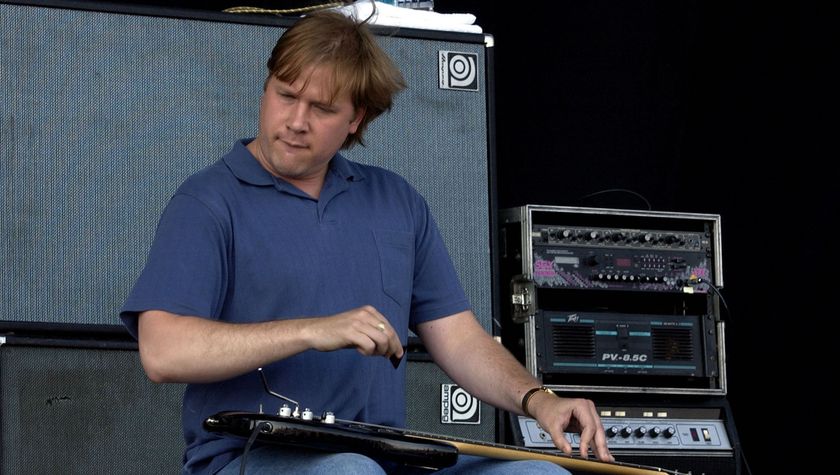
“At some country show I was playing, my dad saw one lying on the floor that somebody left or dropped. I had never seen one before”: He started playing at the age of three, and at 13, he came across something that would help define his unique sound
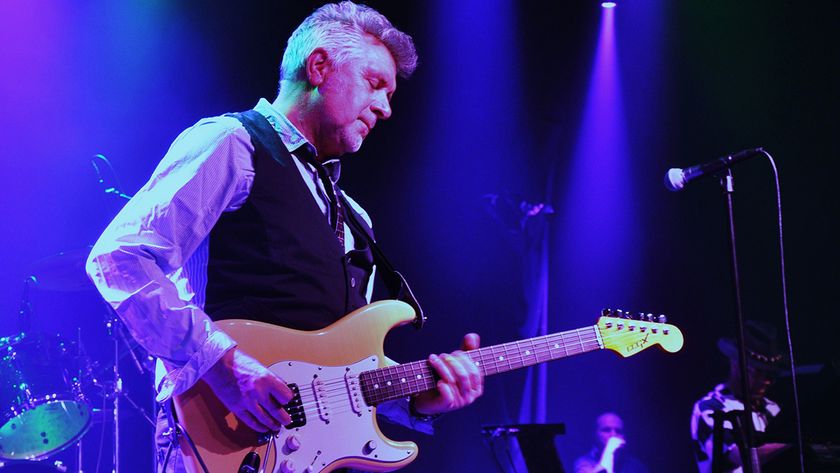
“I got together with Jeff a few years ago. The famous white Strat was sitting on the couch so I said, ‘Jeff, pick it up and play it!’” Rockabilly rover Mick Rogers on playing with Frank Zappa, touring with Kiss, and rootsy jams with Jeff Beck
